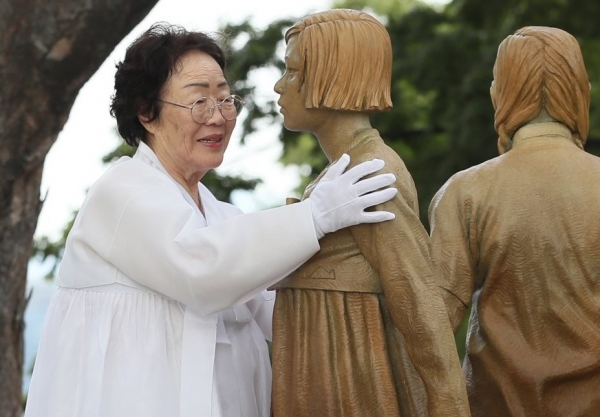
Over a decade during World War II, Japanese military forces forced women from occupied countries, including Korea, into sex slavery. So-called “comfort stations” were set up where acts of sexual violence and torture were committed to “comfort women.” This went undocumented for more than decades after the war ended and remains an unsolved issue. The Japanese government has shown an ingenuine attitude in their apologies in the past and has yet to make sufficient amends.
The testimony by the courage of former comfort woman Kim Hak-Soon in 1991 brought attention to the issue and encouraged other survivors to step forward. Following Kim’s footsteps, some decades later in 2021, former “comfort woman” and human rights activist Lee Yong-Soo, 92 years old, asked the South Korean government to take the unresolved issue to the International Court of Justice (ICJ).
Lee was just 16 years old when she was kidnapped by Japanese soldiers.
“I was lying on the floor one night, looking out the window, and I made eye contact with a girl,” Lee said. “Her neck was pressed to the ground by a Japanese soldier and the girl gestured me to come out.”
Soon after, Lee was shipped to the comfort station in Taiwan where she was forced into sexual slavery.
“If we refused to have sexual intercourse with Japanese soldiers, we were beaten and tortured with electricity,” Lee said. “One time, I cried for my mom so hard that I can still hear it ringing in my ears.”
The years of trauma still reverberate throughout Lee’s life where she is still constantly troubled by the events and actions that she lived through. “Why did they take everything away from us and why haven’t I been able to receive a sincere apology after all these years?” Lee asked.
On Jan. 8, 2021, the Seoul Central district court ordered the Japanese government to pay 100 million Korean won to each of the 12 surviving Korean comfort women. However, Japanese Prime Minister, Yoshihide Suga, claimed that the ruling has no effect due to the principle of sovereign immunity from international law.
“Japan said we, South Korea, violated international law and that we should resort to the ICJ to review the compensation verdict,” Lee said as she reflected on her idea of taking things to the ICJ.
“We have tried to resolve the issue between South Korea and Japan, and we have tried to appeal to other nations for help, but nothing worked. This is my final card and the last thing I can do, so that when I die and meet the others, I can tell them that we made it.”
Lee believes that bringing this matter to the ICJ, South Korea, along with other Asian nations, may foster peace and reconciliation in the region.
Some political commentators worry that bringing the comfort women issue to the ICJ will impact long-term Korea-Japan relations. However, Lee sees this as an opportunity to reconcile that dark period of history between the two East Asian nations.
“It’s like ripping off a bandage,” Lee said. “The solution has been too prolonged. We might have some difficulties along the way, but it is a problem that needs to be solved in order to move on.”
According to Lee, diving into history together can lead to more exchanges between Korea and Japan, which could help educate and enlighten peoples of both nations, leading to a positive change in the future.
However, as there are only a few remaining survivors, Lee hopes to pass on the torch of history to younger generations. She says that they are the hope of the nation and can carry out reconciliation and change.
“I hope they can help encourage the South Korean government to accept my plea of resorting to the ICJ,” Lee said. “I earnestly request them to join in on the journey to redress history.”

